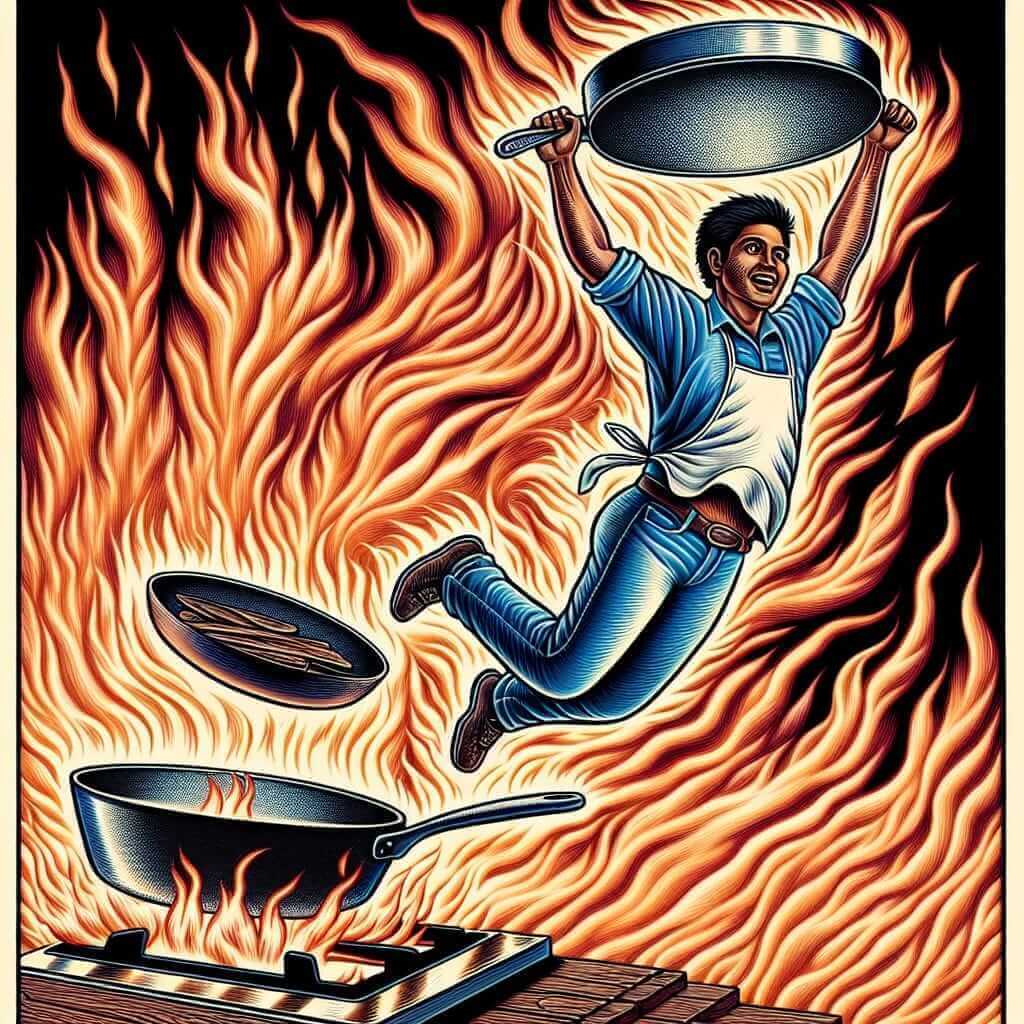The idiom “Out of the frying pan and into the fire” is a common expression in English, often encountered in contexts that test understanding of idiomatic expressions, such as the IELTS exam. This idiom is particularly useful in describing situations where someone has moved from a bad situation into one that is even worse.
- Out of the frying pan and into the fire (/ˈaʊt əv ðə ˈfraɪɪŋ pæn ənd ˌɪntuː ðə faɪər/): From a bad or difficult situation to one that is even worse.
- E.g., “When she changed jobs, she went out of the frying pan and into the fire; the new job was more stressful and demanding.”

Synonyms and Antonyms:
- Synonyms:
- Worsen (v) /ˈwɜːrsən/: To become or make something worse.
- E.g., “His financial situation worsened when he lost his job.”
- Escalate (v) /ˈɛskəleɪt/: To increase in intensity or seriousness.
- E.g., “The conflict escalated quickly, leading to more severe consequences.”
- Worsen (v) /ˈwɜːrsən/: To become or make something worse.
- Antonyms:
- Improve (v) /ɪmˈpruːv/: To make or become better.
- E.g., “Her health improved significantly after starting the new treatment.”
- Mitigate (v) /ˈmɪtɪgeɪt/: To make less severe or serious.
- E.g., “Effective measures were taken to mitigate the impact of the crisis.”
- Improve (v) /ɪmˈpruːv/: To make or become better.
By understanding these related terms, learners can deepen their comprehension of idiomatic expressions and their usage in different contexts.
Analysing the Idiom in IELTS Context
Meaning and Pronunciation
The idiom “Out of the frying pan and into the fire” essentially indicates a transition from an unfavorable situation to an even worse one. The pronunciation is crucial, especially in the speaking component of the IELTS, where clarity and accuracy are tested. Focus on the intonation to convey the idiomatic meaning effectively.
Prevalence in IELTS
Idioms like this one often appear in the IELTS, particularly in speaking and writing sections. Here’s a breakdown:
Speaking Section
- Part 2 Cue Card: You might be asked to talk about a difficult situation you faced. Using idioms can enhance your answer.
- Example: “I once changed jobs to escape a toxic work environment, but it was like jumping out of the frying pan and into the fire.”
Writing Section
- Task 2 Essays: Using idioms can enrich your essays and demonstrate a higher level of language proficiency.
- Example: “Some argue that switching to renewable energy is costly, but continuing with fossil fuels is like going out of the frying pan and into the fire considering the environmental damage.”
Application in IELTS
Example Usage in Different IELTS Sections
Speaking
- “When I moved to the city thinking life would be easier, it was like stepping out of the frying pan and into the fire due to the high living costs.”
Writing
- “People sometimes relocate to escape conflicts in their home country, only to find themselves out of the frying pan and into the fire in refugee camps.”
Collocative Combinations
- “jump/move/step out of the frying pan and into the fire”: These verbs indicate motion, making the idiom more dynamic.
- E.g., “They moved out of the frying pan and into the fire when they switched from a demanding job to a worse one.”
Related Idioms and Expressions
- From bad to worse: Similar in meaning, often used interchangeably.
- E.g., “Things went from bad to worse when the project’s deadline was moved forward and funding was cut.”
- Out of the boiling pot and into the fire: A less common variant.
- E.g., “Switching careers without proper planning can be like going out of the boiling pot and into the fire.”
Conclusion
The idiom “Out of the frying pan and into the fire” is a vivid way to express deterioration in circumstances. Understanding and using such idiomatic expressions can significantly enhance your IELTS performance. Remember to practice using them in context to sound more natural and fluent.
For further practice, try crafting sentences or essays using this idiom and related expressions. This will not only prepare you for the IELTS but also enhance your overall English proficiency.